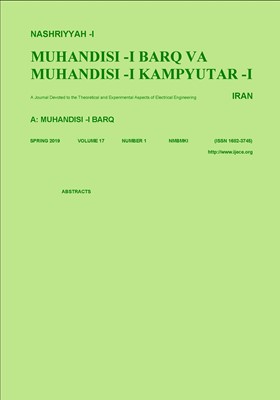Optimal Strategy Determination of Preventive Maintenance Scheduling in the Presence of Demand Response Resources
Subject Areas : electrical and computer engineeringV. Sharifi 1 , M. Rashidinejad 2 * , A. Abdollahi 3 , M. Mollahassani-pour 4
1 -
2 -
3 -
4 -
Keywords: Generation maintenance schedulingnon-cooperative games theoryNash equilibriumdemand response,
Abstract :
In this paper, a new method is proposed for maintenance scheduling of generation units in a competitive electricity market environment. The problem of productive maintenance scheduling is one of the most important problems in the restructured power system due to its impact on the safety and emission of pollutants and producers' profits. In order to consider producers' risk, productive maintenance scheduling has been modeled from the producer's point of view using non-cooperative game theory, which is used to achieve an optimal Nash equilibrium strategy. On the other hand, the independent system operator seeks to achieve a level of appropriate reliability and pollution reduction. In this paper, load response programs are one of the options for influencing energy policy decision-making. Also, the coordination procedure has been used to coordinate producers' maintenance programs with reliability-pollution maintenance program. The proposed model has been implemented on the IEEE-RTS Modified 24 Bus. The results indicate the effectiveness of the proposed method.
[1] FERC, Staff Report, Assessment of Demand Response and Advanced Metering, [Online]. Available: http://www.FERC.gov; Aug. 2006, [Accessed 14.08.12].
[2] A. Abdollahi, M. P. Moghaddam, M. Rashidinejad, and M. K. Sheikh-El-Eslami, "Investigation of economic and environmental-driven demand response measures incorporating UC," IEEE Trans. on Smart Grid, vol. 3, no. 1, pp. 12-25, Mar. 2012.
[3] E. Lakic, G. Artac, and A. F. Gubina, "Agent-based modeling of the demand-side system reserve provision," Electric Power Systems Research, vol. 124, pp. 85-91, Jul. 2015.
[4] M. Parsa Moghaddam, A. Abdollahi, and M. Rashidinejad, "Flexible demand response programs modeling in competitive electricity markets," Applied Energy, vol. 88, no. 9, pp. 3257-3269, Sept. 2011.
[5] L. Wu, M. Shahidehpour, and T. Li, "GENCO's risk-based maintenance outage scheduling," IEEE Trans. on Power Systems, vol. 23, no. 1, pp. 127-136, Feb. 2008.
. [6] PJM Interconnection. Pre-scheduling Operations. Available: http://www.pjm.com/w/media/documents/manuals/m10.ashx; 2010, [Accessed14.08.12].
[7] California Independent System Operator. Outage Coordination Protocol. Available: http://www.caiso.com/docs/2002/03/20/200203201008509285.pdf; 2002, [Accessed 14.08.12].
[8] New York Independent System Operator. Outage Schedule Manual. Available: http://www.nyiso.com/public/webdocs/documents/manuals/opertons/outage_sched_mnl.pdf; 2011 [Accessed 14.08.12].
[9] The North American Electric Reliability Corporation. Operating Manual. Available http://www.nerc.com/files/opman_3_2012.pdf> 2012[accessed 14.08.12].
[10] A. Bozorgi, M. M. Pedram, and G. R. Yousefi, "Unit maintenance scheduling: a robust model, based on fuzzy cost factors and peak loads," Int J. Electr Power Energy Syst, vol. 79, pp. 142-149, Jul. 2016.
[11] M. Mollahassani-pour, M. Rashidinejad, A. Abdollahi, M. A. Forghani, "Demand response resources' allocation in security-constrained preventive maintenance scheduling via MODM method," IEEE Syst J., vol. 11, no. 2, pp. 1196-1207, Jun. 2017.
[12] M. Mollahassani-pour, M. Rashidinejad, and A. Abdollahi, "Appraisal of eco-friendly preventive maintenance scheduling strategy impacts on GHG emissions mitigation in smart grids," J. Clean Prod, vol. 143, pp. 212-223, 1 Feb. 2017.
[13] P. Mazidi, Y. Tohidi, A. Ramos, and M. A. Sanz-Bobi, "Profit-maximization generation maintenance scheduling through bi-level programming," Eur J. Oper Res, vol. 264, no. 3, pp. 1045-1057, 1 Feb. 2018.
[14] M. Mahvi and M. Ardehali, "Optimal bidding strategy in a competitive electricity market based on agent-based approach and numerical sensitivity analysis," Energy, vol. 36, no. 11, pp. 6367-6374, Nov. 2011.
[15] J. Wang, Z. Zhou, and A. Botterud, "An evolutionary game approach to analyzing bidding strategies in electricity markets with elastic demand," Energy, vol. 36, no. 5, pp. 3459-3467, May 2011.
[16] A. M. Foley, B. P. O. Gallachoir, J. Hur, R. Baldick, and E. J. McKeogh, "A strategic review of electricity systems models," Energy, vol. 35, no. 12, pp. 4522-4530, Dec. 2010.
[17] K. Sarica, G. Kumbaroglu, and I. Or, "Modeling and analysis of a decentralized electricity market: an integrated simulation/optimization approach," Energy, vol. 44, no. 1, pp. 830-852, Aug. 2012.
[18] J. H. Kim, J. B. Park, J. K. Park, and Y. H. Chun, "Generating unit maintenance scheduling under competitive market environments," International J. of Electrical Power & Energy Systems, vol. 27, no. 3, pp. 189-194, Mar. 2005.
[19] D. Jia, H. Cheng, W. Zhang, Z. Hu, J. Yan, and M. Chen, "A new game theory-based solution methodology for generation maintenance strategy," European Trans. on Electrical Power, vol. 19, no. 2, pp. 225-239, Mar. 2009.
[20] C. G. Min, M. K. Kim, J. K. Park, and Y. T. Yoon, "Game-theory-based generation maintenance scheduling in electricity markets," Energy, vol. 55, pp. 310-318, 15 Jun. 2013.
[21] A. J. Conejo, R. Garcia-Bertrand, and M. Diaz-Salazar, "Generation maintenance scheduling in restructured power systems," IEEE Trans. on Power Systems, vol. 20, no. 2, pp. 984-992, May 2005.
[22] P. K. Dutta, Strategies and Games: Theory and Practice, the MIT Press, 1999.
[23] M. Parvania and M. Fotuhi-Firuzabad, "Demand response scheduling by stochastic SCUC," IEEE Trans. on Smart Grid, vol. 1, no. 1, pp. 89-98, Jun. 2010.
[24] S. J. Wang, S. M. Shahidehpour, D. S. Kirschen, S. Mokhtari, and G. D. Irisarri, "Short-term generation scheduling with transmission and environmental constraints using an augmented Lagrangian relaxation," IEEE Trans. on Power Systems, vol. 10, no. 3, pp. 1294-1301, Aug. 1995.

